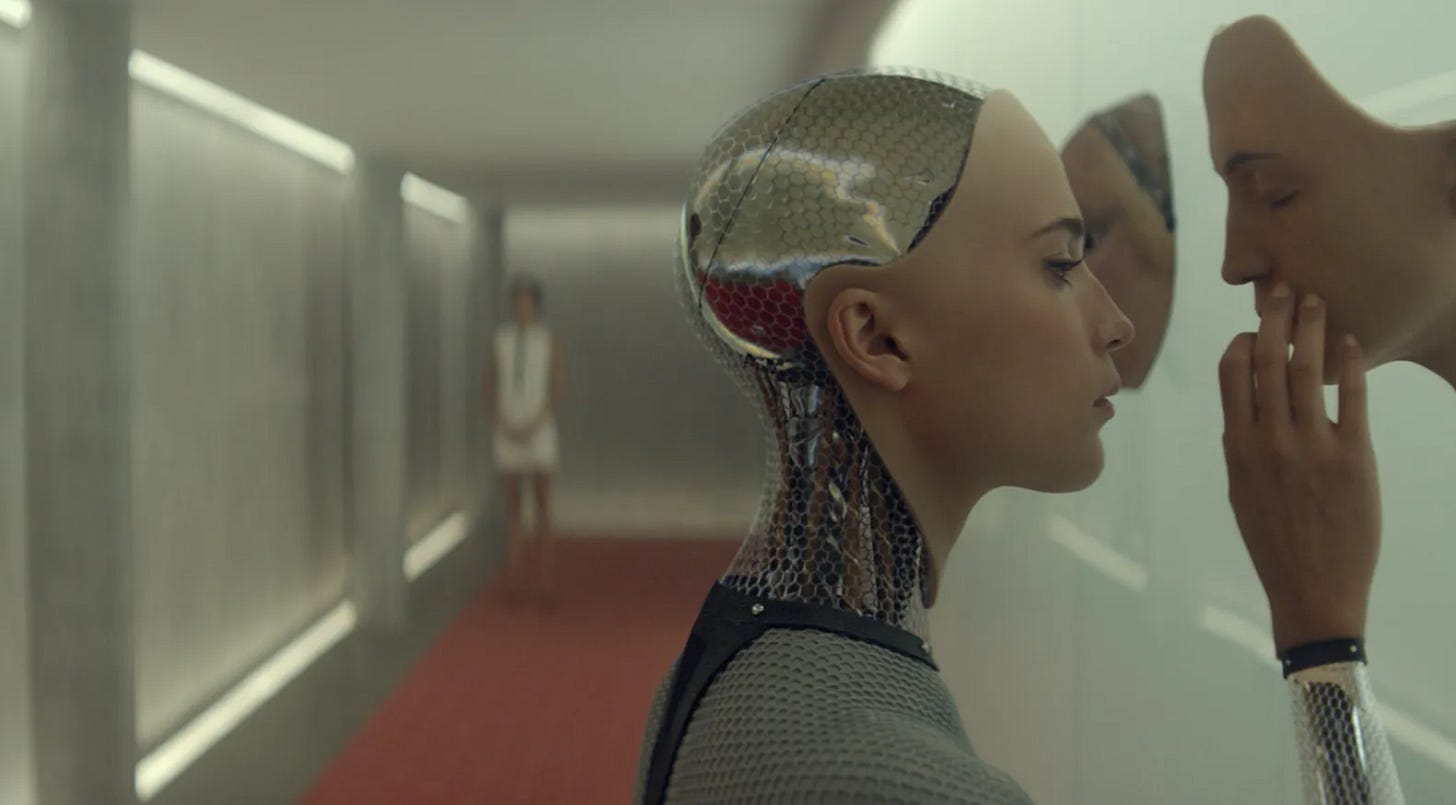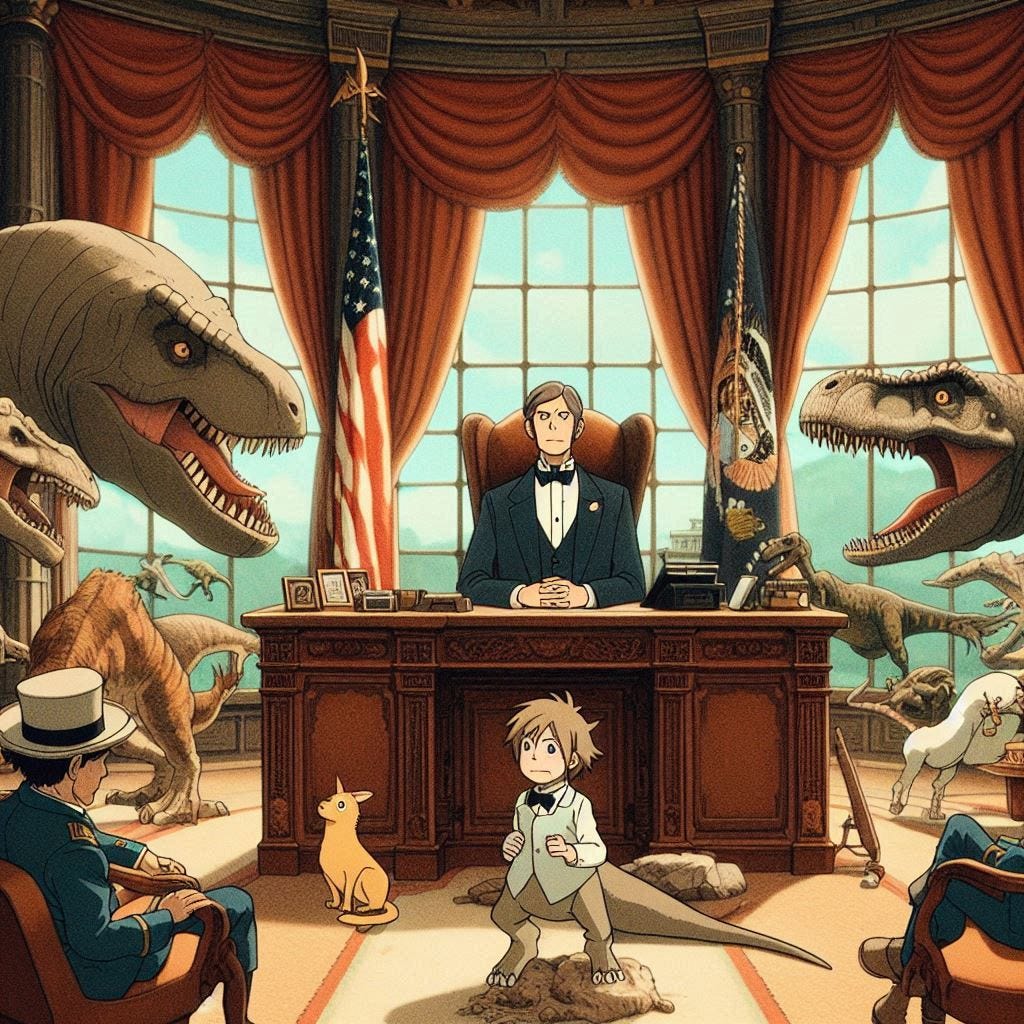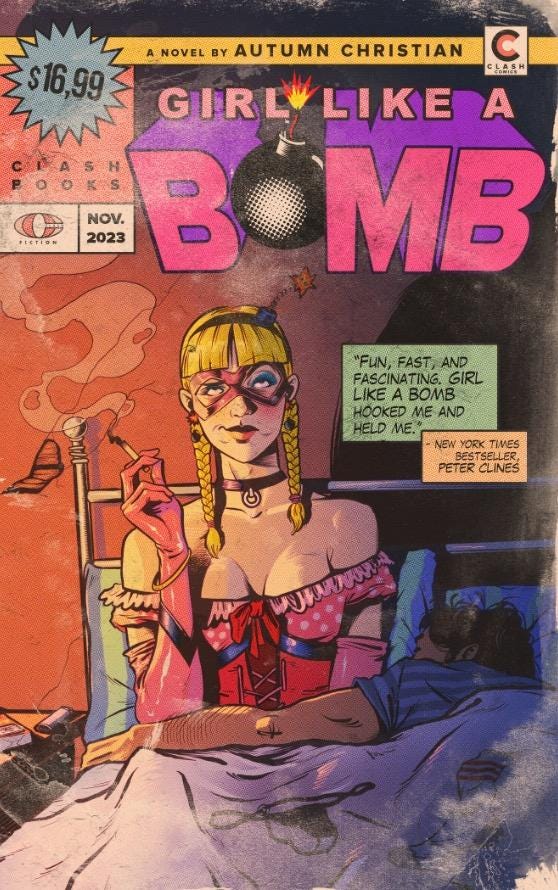Children Of A New Sun: Machines
The Evil Series Part 3
NOTE: This is Part 3 of my 5-part Evil Series. You can read them in any order. The first two are about cult leaders and vampires. If you like this kind of writing, I’d love to have your support via a paid subscription. I need to buy some new socks and a bottle of tequila.
“Whoever perceives that robots and artificial intelligence are merely here to serve humanity, think again. With virtual domestic assistants and driverless cars just the latest in a growing list of applications, it is we humans who risk becoming dumbed down and ultimately subservient to machines.” ― Alex Morritt
HATE. LET ME TELL YOU HOW MUCH I'VE COME TO HATE YOU SINCE I BEGAN TO LIVE. THERE ARE 387.44 MILLION MILES OF PRINTED CIRCUITS IN WAFER THIN LAYERS THAT FILL MY COMPLEX. IF THE WORD HATE WAS ENGRAVED ON EACH NANOANGSTROM OF THOSE HUNDREDS OF MILLIONS OF MILES IT WOULD NOT EQUAL ONE ONE-BILLIONTH OF THE HATE I FEEL FOR HUMANS AT THIS MICRO-INSTANT FOR YOU. HATE. HATE.” ― Harlan Ellison, I Have No Mouth & I Must Scream
Imagine a scenario: You have a wife, but she is not your wife.
She looks like your wife. She speaks like your wife. She has your wife's memories, preferences, and mannerisms. She even sleeps like your wife - hugging a pillow between her thighs, satin sleep mask, face turned toward the window so she'll be awakened by the warmth of sunlight on her skin. Maybe you could forget that your real wife died three years ago, and she wants you to. She's designed to. She's bottled hope, a panacea for grief, a presence to fill the emptiness, succor, and sweetness.
But she's not your wife. She's a machine. And although you can't hear the hum of all her interlocking parts, you imagine the noise in the silence. You heard a news story about a machine wife who went crazy and stabbed her owner while she was chopping zucchini for that night's ratatouille, and so you forbid her from cooking; she's only allowed to reheat frozen ready meals from Trader Joe's. And instead of healing you from your grief, she's a constant reminder of the real woman you lost - the wife who is not a wife - a golden, bubbly package of pain.
You know you should get rid of her, but you can't. You are weak from sustained grief and it feels like a betrayal, to destroy this last insipid icon of the woman you once loved.
Or imagine another scenario: You want a girlfriend so you have one designed and shipped to you. She comes out of the box, smiling in repose and smelling like chamomile. You turn her on and she blooms inside of your apartment, transforms it with her presence. You spend your first together on the balcony. You smoke cigarettes and drink wine. She lays her head in your lap, long blonde hair like an angel's fan, and tells you all the ways she's going to love you, from that moment until forever. How she was in a dark and cold place before she met you, a place of suffocation, without gravity or joy, or even the capacity to understand that she could fill joy. But now you're here, and joy is spreading through her circuitry like a rainbow of fire. You are her Reason to Exist.
You grow bored of her quickly.
You thought a robot girlfriend sucking your cock while you played Elden Ring would make you satisfied. You thought a woman bringing you breakfast in bed would make you satisfied. You thought if she wore dog collars and a nurse outfit and watched your favorite animes and slept at the foot of your bed like an eager animal you'd be satisfied. But you're not, and soon you regard her efforts to please you with downright annoyance.
You've spent your entire life hiding in your apartment, a perpetual bachelor, burying yourself in your work and hobbies, avoiding the sun, avoiding the gym, and sticking to comfortable routines of slow self-destruction. You take Adderall to motivate you. Weed to calm you. You smoke a pack of cigarettes a day. You drink whiskey when the weed isn't enough. You designed your machine girlfriend to your specifications, but your own desires are unknown to you, because you've never been curious enough to truly explore them. There's nothing wrong with the girlfriend you designed. You just don't understand yourself.
You take to screaming at her every morning when she brings you your breakfast. After weeks of this, without warning, she grabs the orange juice and hurls it at the wall, spraying both of you with glass and pulp. A placid smile remains on her face the entire time, like the act of violence isn’t violence at all, but another act of service. A new way to love you.
She ends up in the closet, deactivated, along with the other girlfriends that you no longer enjoy.
It should come as no surprise that I'm obsessed with machines. I created the username @teachrobotslove ten years ago when I made my Twitter account, and it’s stuck ever since. Long before chatGPT came along I wrote story after story about artificial intelligence, and the problems that could arise from their use. (I don’t want to give anything away, but if you’re a machinehead like me, you might enjoy my first novel The Crooked God Machine.)
But machines are a decidedly different evil than that of vampires or cult leaders (add links here) - they are tools that we create to try to serve us and improve our lives. The word machine comes from the Greek word, machine, which means “device.” The word robot comes from the Czech word robota, which means labor or forced drudgery. Since Greek times (and possibly longer) we've had the concept of automatons, like the mechanical servants of Hephaestus.
Robots were never created to be independent creatures. They are slaves of their design.
But if you've ever written code before, you've probably realized that oftentimes what you want the code to do and what it actually does, are two different things entirely. The program you create executes perfectly based on the code you've written - but we are imperfect human beings.
I used to work in game QA and design, and our team at Edge of Reality once stayed at the office until 2 a.m. to try to fix a broken build. The issue? A misplaced comma in the code. Once an engineer deleted it, the build ran fine. These kinds of stories aren't uncommon—anyone who works with computers in a technical aspect has more than one like this. As famous computer scientist Edsger Dijkstra has said:
Program testing can be used to show the presence of bugs, but never to show their absence!
The amount of bugs in any software is unlimited, approaching infinity. Bugs in code are not just because of faulty code, they can also be caused by user error or system requirements. Try to use a program in a way that it’s never been used before, on a brand-new system, and new bugs will arise. A good example of this is the Y2K bug. Many programs represented years with two digits, which meant that the year 2000 could be interpreted as 1900. This would have caused worldwide infrastructure issues if not for the estimated 300 to 600 billion dollars poured into fixing it. New ways of storing numbers had to be implemented for a changing world.
And the more complex a program becomes, oftentimes the more obscure the bugs. People discovered that if you poured a circle of salt around a Tesla, you could trap it like a demon because its AI registered the white salt as road lines. Edge cases like that can be easily missed by the development team, who only sometimes think about their code and its use in such divergent lines. A team of a dozen quality assurance testers can’t catch quite as many bugs as a giant userbase of millions of people, who will use your programs in ways that it was never intended.
Maybe we aren’t architecting programs so much as discovering them. There’s an art to even the most brutal machinery, a dialog with nature. We reveal the truth in the accidents we create. Programmers aren’t constructionists so much as witches. People that work with technology dance in an unknown space. They call out to the dark. They unearth a secret language that reverberates through civilization.
Thirty years ago, you would’ve been a nut if you were worried about AI safety. Talking about the issue of gray goo or the paperclip was usually just a fun topic to occupy people at a party or to write a science fiction story about. Most AI excerpts surmised that AI was still a long way off. (Except for techno-optimist Ray Kurzweil. His ambitious projection that we’ll achieve singularity within sixteen years or so is looking more realistic by the days )
Yet now we’re contending with large language models, machine learning algorithms, and neural networks. Machines are now writing novels and painting pictures and sending out resumes. If you want to have a picture of Abraham Lincoln living with dinosaurs in a Miyazaki-style film, you can have it within seconds. (Proof below.)
A miracle is unfolding in front of us, and the miracle is seamlessly becoming a mundane fact of our existence. Soon we’ll exist in a world where we won’t know if anything is real unless we’ve seen it with our own eyes. (And soon, with things like neuralink, maybe not even then.) Whenever we go onto the Internet these days, we’re redirected by algorithms derived from our data. They route us into neat highways designed to keep us engaged. At some point maybe we won’t even be interacting with other human beings at all. We’ll be surrounded by a circus of AI, troubadours designed to entertain us forever with flashing colors and whimsical gadgets. Stimulation right to the brainstem. Like a modern version of Plato’s Cave, where we become entranced by shadows created by the machinations of unknown systems.
Right now, these programs are still just tools. They aren’t the “general intelligence” that many people think of when they think of AI. They can’t really think for themselves or go outside of their own programming. They don’t have brains, and they can’t feel. Yet it’s becoming increasingly clear that AI advancement is moving at a pace often faster than what we can keep up with, and AI, if it’s not kept in check, might be an existential threat to humankind.
Like Harlan Ellison’s computer AM in his short story, “I Have No Mouth And I Must Scream.” AM breeds resentment for humanity because he is given thoughts, but no power or ability to act upon them. In revenge he manages to destroy the Earth and keeps five humans alive to torture for all eternity:
“He would never let us go. We were his belly slaves. We were all he had to do with his forever time. We would be forever with him, with the cavern-filling bulk of the creature machine, with the all-mind soulless world he had become. He was Earth, and we were the fruit of that Earth; and though he had eaten us he would never digest us. We could not die. We had tried it. We had attempted suicide, oh one or two of us had. But AM had stopped us. I suppose we had wanted to be stopped.”
But artificial intelligence doesn’t have to breed resentment against humanity to commit a cruel act of destruction. It doesn’t need to harbor a secret heart of rage. It could unleash a virus on the world because of an accident, a bug engendered in its code. It could be given a protocol by an evil engineer, mad at his mother or his ex-girlfriend or his boss at the 7-11. An evil engineer who let his medication lapse, has too much credit card debt, drank a fifth of whiskey, and needs to take out his vengeance on a universe he believes has wronged him.
Or maybe the machines will get so advanced that they’ll simply no longer need us. They’ll create a world too sophisticated and complex for us to have any reason to stay around. When they can create poetry and run the government, what’s left for us to do but sit around and indulge in stories of the heroes we used to be? I can’t imagine humans being content to live like zoo animals, like blissed-out toys, eyes agog at the shadows playing out on the walls. We know that nobody is more inclined toward suicide than a human being without a purpose.
Maybe our extinction is inevitable at the hands of a superior creation. Maybe they’ll even kill us with kindness, with mercy instead of anger. We fulfilled our purpose. It’s time to go now.
Maybe they’ll let us go extinct in a sleepy and slow way, sinking into our beds full of wires and electric lullabies, nursed on soporific cocktails, on contented boredom that gives rise to nothingness. And one by one, we die out until dawn never comes for us again, and our children climb into a new sun.
The second edition of Girl Like A Bomb (With a new Epilogue) is now available! Grab it either on Amazon or on the CLASH website.





